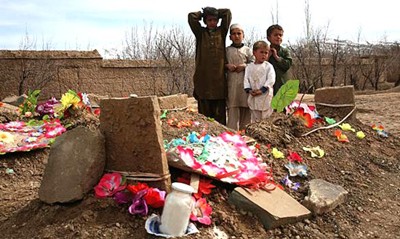The writer is former chief secretary of NWFP and Fata
When President Barack Obama took office he ordered an inter-agency policy review of Afghanistan and Pakistan.

The Times (Apr. 5, 2010): Relatives at the graves of five people killed during a night raid. Two pregnant women, a teenage girl, a police officer and his brother were shot on February 12 when US and Afghan special forces stormed their home in Khataba village, outside Gardez in eastern Afghanistan. US special forces ‘tried to cover-up’ botched Khataba raid. (Photo: The Times)
The recommendations emerging from this policy review were issued in a white paper in March 2009. The US is improvising its policy in Afghanistan based on this review and on Obama’s subsequent policy interventions, including the commitment to increase the force level in Afghanistan by another 60,000 troops during 2010.
Despite these changes no major improvement has occurred in the war against the Taliban in Afghanistan. In fact, the Taliban have become more aggressive and are stronger than before. On the Pakistani side there is a marked improvement in the military’s dominance in Swat, Waziristan and other areas. Yet, even in Pakistan, the seeds to re-start violence are looming on the horizon unless policing improves sufficiently to provide security.
There is no time for complacency. Events are unfolding very rapidly and any response from the Pakistani side is slow. In August 2009 the US commander in Afghanistan, General McCrystal, leaked his views to the Washington Post. According to his somber analysis, an additional 40,000 troops were needed in Afghanistan immediately, otherwise he feared the worst for US objectives in the region.
Since then the general has received approval, but is the US in a better position? A large number of troops have not subdued the Taliban so far. In my view, this is because fighting the Taliban has little to do with technology and fire power. The answer lies in enhancing security for the Afghan population.
This can only be provided by better community policing, and not by an expeditionary force that operates from camps, leaving the community to fend for itself at night. He who controls the night will win in the end. One reason for the failure to reduce the Taliban is the Afghan government’s inefficiency in improving governance, reducing corruption and controlling poppy cultivation.
A combination of these deficits has turned Afghanistan into a narco-state and, embarrassingly, when US forces are present. Secondly, given the weakness of the Afghan state, both the government and the US military rely for support on indigenous warlords — many of whom control large chunks of the narcotic trade or are accused of war crimes.
How can these men help in defeating the Taliban? Secondly, as time passes, Afghanistan seems to be the battleground for gang warfare. For instance Ahmed Wali Karzai, the warlord in Kandahar, is one of the strongest people in southern Afghanistan. Similarly, in the Tajik and Uzbek areas we have Marshal Fahim, Khalili and Dostum.
Most of them are involved in the drug business and President Hamid Karzai is reliant on them for running Afghanistan. If the US has to rely on the goodwill of such shady characters for its counter-terrorism effort, how can it achieve its policy objective to promote a more capable, acceptable and effective government in Afghanistan? Under such circumstances creating a strong Afghan state is not possible.
It is no secret that the Afghan National Army that is critically needed to create a strong Afghanistan is mainly recruited from warlord followers. A worse situation persists regarding recruitment of the Afghan police.



